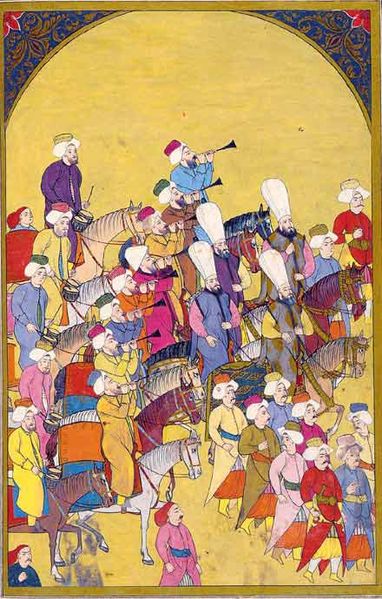The court in Adrianople is amazing. The Grand Signor’s eldest daughter, Fatma Sultan, was married a few days before I arrived. She is the widow of the late Vizier who was killed at Peterwaradin. Fatma never actually lived with him, but when the Vizier died, all of his wealth became hers. When Fatma met Mosayp, who is about fifty years old, she burst into tears. Although he is a man of quality and is a favorite of the Sultan, it wasn’t enough to make him appealing in the eyes of Fatma, who is only thirteen years old.
As powerful as the Grand Signor is, he trembles before the Turkish army. The army has absolute power over the government. If, for example, the minister of state were spoken badly of in a coffeehouse, the whole place would be shut down because there are spies everywhere. However, if a minister displeases the people he is dragged out to the street and his hands, head and feet are cut off. I can’t help but wish that English Parliament would send a bunch of your passive obedient men so they can see arbitrary government in its strongest light!
Yesterday, I went with the French Ambassadress to see the Grand Signor’s passage to the mosque. He was led by many janissaries (these were horse and foot guards) who wore huge white feathers on their heads and were dressed in lively colors. From a distance they looked like a garden of tulips! After the janissaries was the Aga of the janissaries, dressed in a purple velvet robe, lined with silver, whose two well-dressed slaves led him by a horse. Next to Aga, was the Kuzlir Aga dressed in a yellow cloth and six more horses richly furnished were led after him. I won’t bore you with all of the details on the various dresses and turbans (which distinguishes their rank) but know that they were all extremely rich and happy. There really couldn’t have been a more beautiful procession.
As powerful as the Grand Signor is, he trembles before the Turkish army. The army has absolute power over the government. If, for example, the minister of state were spoken badly of in a coffeehouse, the whole place would be shut down because there are spies everywhere. However, if a minister displeases the people he is dragged out to the street and his hands, head and feet are cut off. I can’t help but wish that English Parliament would send a bunch of your passive obedient men so they can see arbitrary government in its strongest light!
Yesterday, I went with the French Ambassadress to see the Grand Signor’s passage to the mosque. He was led by many janissaries (these were horse and foot guards) who wore huge white feathers on their heads and were dressed in lively colors. From a distance they looked like a garden of tulips! After the janissaries was the Aga of the janissaries, dressed in a purple velvet robe, lined with silver, whose two well-dressed slaves led him by a horse. Next to Aga, was the Kuzlir Aga dressed in a yellow cloth and six more horses richly furnished were led after him. I won’t bore you with all of the details on the various dresses and turbans (which distinguishes their rank) but know that they were all extremely rich and happy. There really couldn’t have been a more beautiful procession.

While this isn't exactly what we say, I thought it would help you guys get an idea! The music band of the Janissaries called mehterhane. They accompanied the company into battle and would play music according to the rhythm of the battle. The music was also used as a way of communication, such as retreat or attack. Ottoman miniature painting, from the "Surname-ı Vehbi" (fol. 171b). Topkapı Sarayı Müzesi, Istanbul.
We also saw the Sultan, who looks about forty, and is very handsome and graceful. But his eyes are so full and black; there is something severe in his expression. He stopped under the window where we stood and looked at us very attentively.
I really can't stress enough the power the janissaries have in this country. I was having supper one night in a village on this side of Phillipopolis where our domestic guard met us. I asked for pigeons for my supper and one of my janissaries immediately ordered the cadi (the chief civil officer of the town) to send in some dozens. The poor man said he already sent some and couldn’t get any more. My Janissary immediately locked him up as a prisoner and out of respect to me, said he would punish him by my order, and if I wanted, he would bring me his head! This should show you the unlimited power these men have. The greatest man at Court speaks of them in a flattering tone only... But, I’ve said enough!
I really can't stress enough the power the janissaries have in this country. I was having supper one night in a village on this side of Phillipopolis where our domestic guard met us. I asked for pigeons for my supper and one of my janissaries immediately ordered the cadi (the chief civil officer of the town) to send in some dozens. The poor man said he already sent some and couldn’t get any more. My Janissary immediately locked him up as a prisoner and out of respect to me, said he would punish him by my order, and if I wanted, he would bring me his head! This should show you the unlimited power these men have. The greatest man at Court speaks of them in a flattering tone only... But, I’ve said enough!
 RSS Feed
RSS Feed